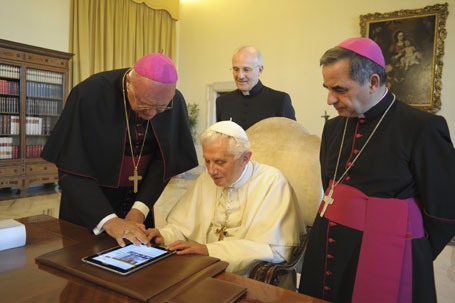BTURN teams up with SHARE Conference, a three-day international event in Belgrade, Serbia, focusing on Internet, new media and social activism, packed with talks, discussions, presentations and music gigs. In the upcoming weeks, we keep you informed on whos and whats of this year’s edition of all things geeky and subversive
Founded by a 19-year-old Swedish philosophy student Isak Gerson, the Missionary Church of Kopimism is a unique form of congregation, gathering file sharers who claim copying information is a sacred virtue, “the best and most beautiful that is”.
Kopyacting – sharing knowledge through acts of copying – is a special kind of religious service where “those in attendance can communicate with each other via a compatible internet protocol, via for example a local area network, Internet or Bluetooth connection”. The church, which holds the copy/paste keyboard shortcuts CTRL+C and CTRL+V as sacred symbols, has recently been officially recognised by the Swedish authorities as a religious community, after three failed attempts. In the meantime, it has launched off-shot franchises across the globe, making Kopimism a small “world religion” on its own.
As the Kopimist constitution claims (shouldn’t it be called “the wholy file” or something?), “to belong to the Kopimist community, one need not be a member of any organisation. It is enough that one feels called to respect and worship the holiest of the holies, information.”
If religious institutions have been acting political since their beginnings, it doesn’t surprise that today’s political movements are becoming religions. And in many ways, isn’t that what Kopimism essentially is – a political movement, part of a global struggle for free information?
What exactly “free information” means remains an ongoing topic of various legal and philosophical debates, but in the centre of the discussion had always been the practice of copyright. From early on, copyright has been related to the rise of capitalism and the increasing commodification of our human experience, where thoughts, ideas and works of art need to be regulated as personal properties with a specific economic and market value. Ever since the Gutenberg printing press to our own age of Napsters, Pirate Bays, Wikileakses, Megauploads, the RRIAs, PIPAs and SOPAs, governments and large corporations have been negotiating on how to control the distribution of information.
 At the same time, in those early stages of development, capitalism as a politico-economic project kept a profound link with its religio-cultural partner, Protestant Christianity. Central to both of them was the discourse of possessive individualism. What was the first copyrighted book? The Bible, of course.
At the same time, in those early stages of development, capitalism as a politico-economic project kept a profound link with its religio-cultural partner, Protestant Christianity. Central to both of them was the discourse of possessive individualism. What was the first copyrighted book? The Bible, of course.
It doesn’t really surprise that contemporary digital capitalists are today’s new evangelists. This time, however, the religion is based not on the sanctity of property but on the very absence of it.
Yet, in all its fight for free information, Kopimism seems to retain some of traditional religion’s traits. In case of a confession, Kopimist spiritual leaders (called Ops, short from Operators), have a pledge to keep secrecy, just like ordinary priests. It hardly helps information to be free, but don’t expect CIA rushing to Kopimist Ops to “confess” their data and have it locked in some “eternal encryption”. After all, it’s a power game.
 The French philosopher Michel Foucault famously stressed out the relationship between power and knowledge: by controlling the production and distribution of knowledge, the ones in power control the ways we construct ‘truths’ of our own world. Previously in the 1930s, German Marxist intellectual Walter Benjamin wrote about the emancipating potentials of “the age of mechanical reproduction”, where a work of art looses its privileged, elitist notion of “aura” through acts of copying and mass distribution, becoming an information more accessible to the working classes. Surely, Benjamin could have dreamt of a more efficient and democratic “age of digital reproduction”, but would he have thought of information achieving religious status?
The French philosopher Michel Foucault famously stressed out the relationship between power and knowledge: by controlling the production and distribution of knowledge, the ones in power control the ways we construct ‘truths’ of our own world. Previously in the 1930s, German Marxist intellectual Walter Benjamin wrote about the emancipating potentials of “the age of mechanical reproduction”, where a work of art looses its privileged, elitist notion of “aura” through acts of copying and mass distribution, becoming an information more accessible to the working classes. Surely, Benjamin could have dreamt of a more efficient and democratic “age of digital reproduction”, but would he have thought of information achieving religious status?
The Kopimist constitution is based on four key points:
* All knowledge to all
* The search for knowledge is sacred
* The circulation of knowledge is sacred
* The act of copying is sacred
Today, Kopimism has a number of “national churches” across the world (US, Canada, Japan, Denmark, Italy, France, among others). As far as Eastern Europe is concerned, there are strangely few, considering the role of post-1990s “free culture” in these societies. So far it seems only the Romanians and the Russians have embraced the religion in full. Would be difficult to imagine Kopimism without those funky .ru file sharing forums, wouldn’t it?
However, the love affair between technology and religion is hardly a new one. Islam already has dozens of digital tools and apps to enhance the users’ divine experience. So does Christianity. Even the Orthodox Christians, traditionally more suspicious of high tech, have been trying to catch the wave. Although the Balkans’ religious authorities prefer to stick to their analog roots, collecting funds for their Audis and 24k chains not through Flattr or Kickstarter but through hard copy cash injections, some of them have already gone digital – like the Serbian Orthodox Church putting out iPhone and Android apps for all its worshipers. For free!
Indeed, thou shall copy. With or without churches. Because thou art shallow, vain and sinful and shall burn in hell forever. Amen.
*Isak Gerson of Kopimism will be lecturing at SHARE2 Conference in Belgrade, Serbia, Apr 26-28. More info: shareconference.net

















